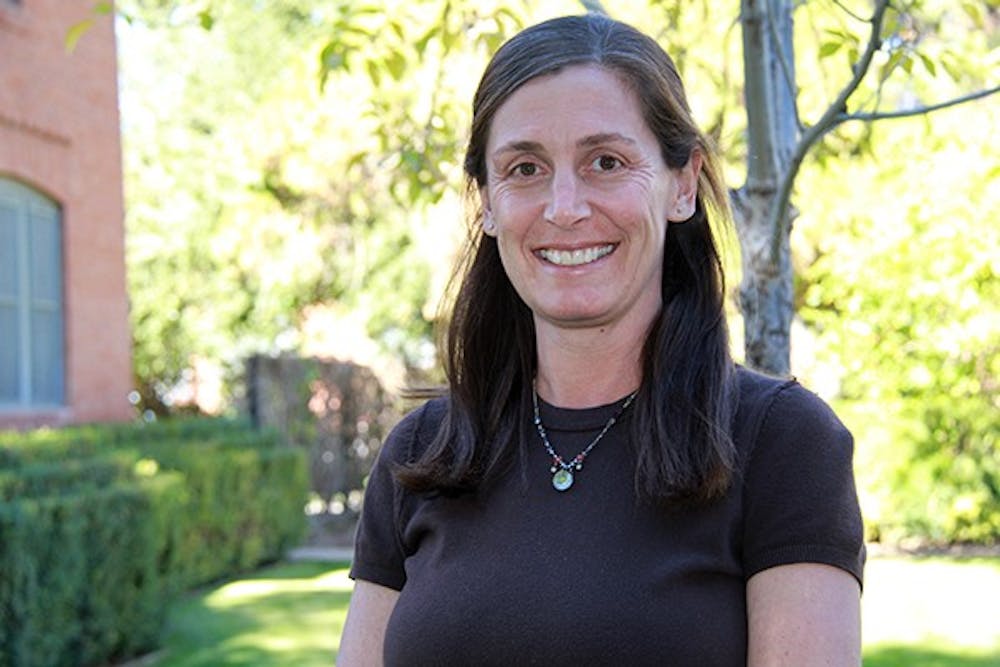 School of Life Sciences professor Dr. Leah Gerber proposed a solution, nicknamed "whale shares", to combat the poor management of whales and further efforts in whale conservation. (Photo by Becca Smouse)
School of Life Sciences professor Dr. Leah Gerber proposed a solution, nicknamed "whale shares", to combat the poor management of whales and further efforts in whale conservation. (Photo by Becca Smouse)Nearly 30 years ago, the International Whaling Commission placed a moratorium on commercial whaling, decreasing the chance of whale extinction though angering many whaling countries that had long practiced hunting. Subsequently, whaling countries have found loopholes to the moratorium.
School of Life Sciences professor Dr. Leah Gerber has proposed “whale shares” as a possible solution to much of the gridlock that surrounds whale management, as well as the efficacy of conservationists’ activism.
Gerber’s research has been published in the January issue of Ecological Applications, but it began years ago while on sabbatical at the University of California, Santa Barbara.
“Currently the problem is how we're managing whales," she said. "They’re an international resource. There is no incentive for a whaler to give up this resource. If a conservationist wants to save whales, there’s an actual market where we can facilitate the transaction of a share.”
Gerber said the transaction saves whales from harvesting and creates a conservation market. Whalers may receive financial gain through the whale shares and conservationists may see a decrease in the number of whales hunted, thus decreasing the chance of extinction.
“Currently there’s a big lawsuit," she said. "Australia has sued Japan over its use of scientific whaling. Japan and other whaling nations will continue whaling, and there is recognition that the IWC needs a new approach.”
Gerber said she would like to introduce new ways of thinking about the many dilemmas of whaling. She said she believed whale shares could be an enticing idea for those in international government.
Critics of Gerber’s whale shares, however, say the approach places a market value on sentient beings. Ethics are called into question when placing a dollar value on the highly intelligent species.
Arizona Zoological Society Chair Ben Minteer worked with Gerber to address some of the ethical concerns raised. He said as an ethicist, he is sensitive to the concerns but sees a need for a workable policy.
“If you’re serious about conservation, there’s an argument for trying something else,” he said. “There’s a rejection of pricing nature, and we have to be careful about relying on the market, but at the same time, when it’s clear that traditional practices are not working, we do have a responsibility to try something else. The challenge is maintaining the sense that whales matter.”
Minteer said he felt that research such as this is especially facilitated through the interdisciplinary nature of the School of Life Sciences at ASU.
“A marine biologist can collaborate with an ethicist here,” he said. “We have a lot of ideas about how we can think differently about conservation that is sensitive to pragmatics, but in a way that is ethically justifiable.”
Governance and public policy professor Abby York said she agreed largely with Minteer.
“ASU provides opportunities to establish these collaborative teams that are very different from what you might find at other universities,” she said. “Students have something really unique, because ASU has been engaging undergraduate research as well.”
York said the collective goal of the research accomplished so far with Minteer and Gerber was to initiate a dialogue among policymakers about alternatives.
“We hope to facilitate conversation among different groups," she said. "We feel at least the conversation should be had. Leah has increasingly reached out to organizations and stakeholders on her own.”
Gerber said so far she has received positive feedback from high level officials, though she is still gathering opinions informally. She said she hopes to spend time talking with people in international government and expanding her research.
Reach the reporter at cncalde1@asu.edu or follow her on Twitter @katie_calderon




